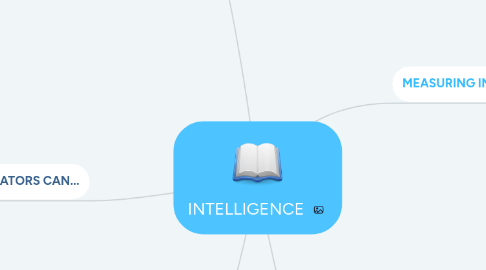
1. THEORISTS
1.1. Raymond Catell
1.1.1. Fluid intelligence
1.1.1.1. Ability to solve problems
1.1.1.2. Acquire new skills
1.1.1.3. Figure out what to do in a situation in which you are unsure of what to do
1.1.2. Crystallised intelligence
1.1.2.1. Involves use of previously developed skills
1.1.2.1.1. Reading
1.1.2.1.2. Langauge
1.1.2.1.3. Writing
1.2. Howard Gardner
1.2.1. 8 levels of intelligence
1.2.1.1. 1. Logical-mathematical
1.2.1.2. 2. Linguistic
1.2.1.3. 3. Spatial
1.2.1.4. 4. Musical
1.2.1.5. 5. Bodily-kinaesthetic
1.2.1.6. 6. Interpersonal
1.2.1.7. 7. Intrapersonal
1.2.1.8. 8. Naturalistic
1.2.2. Multiple Intelligences theory
1.2.2.1. Abilities are seperate
1.2.2.1.1. Children can have multiple abilities
1.3. Alfred Binet
1.3.1. Developed scales used to identify mental level
1.3.1.1. Focus on end product of intelligence
1.4. Robert Sternberg
1.4.1. Triarchic theory of intelligence
1.4.1.1. Analytical
1.4.1.1.1. Ability to
1.4.1.2. Creative
1.4.1.2.1. ability to
1.4.1.3. Practical
1.4.1.3.1. Ability to
2. EDUCATORS CAN...
2.1. Promote 'cognitive stategies'
2.2. Provide support
2.2.1. Encourage/motivate
2.3. Have open-mindedness about children's development in intelligence
2.4. Offer personalised scaffolding during one-on-one time
2.5. Ensure an inclusive classroom
3. DEFINED AS
3.1. Ability to
3.1.1. Retain knowledge
3.1.2. Adapt and change within environment
3.1.3. Learn
3.1.4. Profit from previous experience
3.1.5. Achieve intelligence through environmental surroundings
3.2. Capacity for
3.2.1. Understanding
3.2.2. Self-awareness
3.2.3. Reasoning
3.2.4. Planning
3.2.5. Problem solving
4. MEASURING INTELLIGENCE
4.1. Stanford-Binet Intelligence scales
4.1.1. Gather overall IQ
4.1.2. Verbal and non-verbal responses measured
4.1.3. Gauge intelligence with 5 factors of cognitive ability
4.1.3.1. Working memory
4.1.3.2. Visual-spatial processing
4.1.3.3. Fluid reasoning
4.1.3.4. Quantitative reasoning
4.1.3.5. Knowledge
4.2. Differential ability scales
4.2.1. used to assess cognitive ability
4.2.2. Testing done with children aged 2-17yrs
4.3. Wechter intelligence scale
4.3.1. symbolic and spatial memory testing
4.3.2. 13 tests
4.3.2.1. verbal testing
4.3.2.2. object manipulation
5. HOW CHILDREN GATHER INTELLIGENCE
5.1. Heredity
5.1.1. Inherited characteristics from parents
5.2. Experience
5.2.1. past experience/prior knowledge
5.3. Environmental
5.3.1. Nutrition
5.3.2. Parental influence
5.3.2.1. nature/nurture
5.3.3. Home life
5.3.4. Toxic substance

